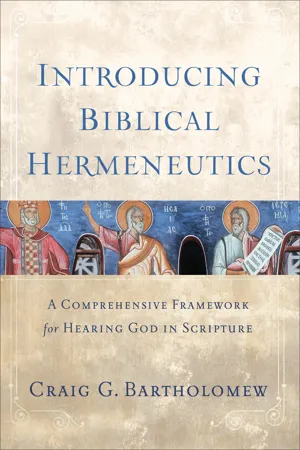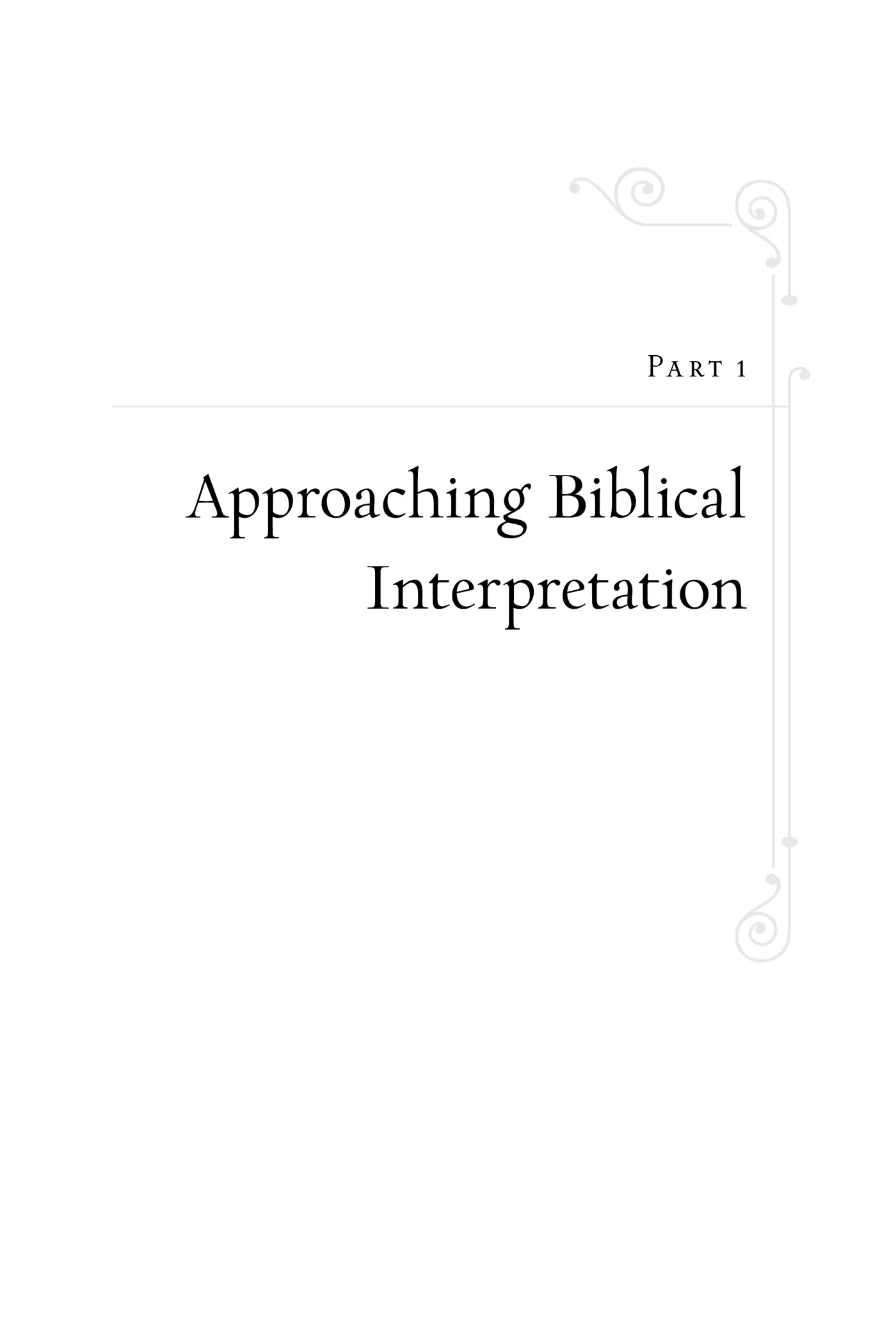
eBook - ePub
Introducing Biblical Hermeneutics
A Comprehensive Framework for Hearing God in Scripture
Bartholomew, Craig G.
This is a test
- 640 pagine
- English
- ePUB (disponibile sull'app)
- Disponibile su iOS e Android
eBook - ePub
Introducing Biblical Hermeneutics
A Comprehensive Framework for Hearing God in Scripture
Bartholomew, Craig G.
Dettagli del libro
Anteprima del libro
Indice dei contenuti
Citazioni
Informazioni sul libro
2016 Word Guild Award - Academic category
Honorable mention, Grace Irwin Prize Renowned scholar Craig Bartholomew, coauthor of the bestselling textbook The Drama of Scripture, writes in his main area of expertise--hermeneutics--to help seminarians pursue a lifetime of biblical interpretation. Integrating the latest research in theology, philosophy, and biblical studies, this substantive hermeneutics textbook is robustly theological in its approach, takes philosophical hermeneutics seriously, keeps the focus throughout on the actual process of interpreting Scripture, and argues that biblical interpretation should be centered in the context and service of the church--an approach that helps us hear God's address today.
Domande frequenti
Come faccio ad annullare l'abbonamento?
È semplicissimo: basta accedere alla sezione Account nelle Impostazioni e cliccare su "Annulla abbonamento". Dopo la cancellazione, l'abbonamento rimarrà attivo per il periodo rimanente già pagato. Per maggiori informazioni, clicca qui
È possibile scaricare libri? Se sì, come?
Al momento è possibile scaricare tramite l'app tutti i nostri libri ePub mobile-friendly. Anche la maggior parte dei nostri PDF è scaricabile e stiamo lavorando per rendere disponibile quanto prima il download di tutti gli altri file. Per maggiori informazioni, clicca qui
Che differenza c'è tra i piani?
Entrambi i piani ti danno accesso illimitato alla libreria e a tutte le funzionalità di Perlego. Le uniche differenze sono il prezzo e il periodo di abbonamento: con il piano annuale risparmierai circa il 30% rispetto a 12 rate con quello mensile.
Cos'è Perlego?
Perlego è un servizio di abbonamento a testi accademici, che ti permette di accedere a un'intera libreria online a un prezzo inferiore rispetto a quello che pagheresti per acquistare un singolo libro al mese. Con oltre 1 milione di testi suddivisi in più di 1.000 categorie, troverai sicuramente ciò che fa per te! Per maggiori informazioni, clicca qui.
Perlego supporta la sintesi vocale?
Cerca l'icona Sintesi vocale nel prossimo libro che leggerai per verificare se è possibile riprodurre l'audio. Questo strumento permette di leggere il testo a voce alta, evidenziandolo man mano che la lettura procede. Puoi aumentare o diminuire la velocità della sintesi vocale, oppure sospendere la riproduzione. Per maggiori informazioni, clicca qui.
Introducing Biblical Hermeneutics è disponibile online in formato PDF/ePub?
Sì, puoi accedere a Introducing Biblical Hermeneutics di Bartholomew, Craig G. in formato PDF e/o ePub, così come ad altri libri molto apprezzati nelle sezioni relative a Théologie et religion e Études bibliques. Scopri oltre 1 milione di libri disponibili nel nostro catalogo.
Informazioni
Argomento
Théologie et religionCategoria
Études bibliquesPart 1: Approaching Biblical Interpretation

1
Biblical Interpretation Coram Deo
In this way I hope to be able to show most clearly to my readers that hermeneutics is no esoteric teaching but the theory of a practice.
Hans Robert Jauss1
Introduction
It is hard to overestimate what is at stake in biblical interpretation. According to Hebrews, “in these last days he [God] has spoken to us by a Son, whom he appointed heir of all things, through whom he also created the worlds” (Heb. 1:2). Similarly in 1 John we read:
We declare to you what was from the beginning, what we have heard, what we have seen with our eyes, what we have looked at and touched with our hands, concerning the word of life—this life was revealed, and we have seen it and testify to it, and declare to you the eternal life that was with the Father and was revealed to us—we declare to you what we have seen and heard so that you also may have fellowship with us; and truly our fellowship is with the Father and with his Son Jesus Christ. (1 John 1:1–3)
If for a moment we defamiliarize ourselves with these texts, step back, and quietly reflect on them, we begin to sense the enormity of their claims:
In these last days . . . God has spoken . . . by a Son . . . through whom he created the worlds . . . what was from the beginning . . . what we have seen . . . what we have touched . . . the word of life . . . we declare to you.
If these claims are true, then their implications are huge, and they connect with our deepest needs. In Ecclesiastes, Qohelet observes in chapter 3 that God has put eternity in our hearts, but we cannot find out what God has done from the beginning to the end.2 We are creatures who need to know the true, grand story of which we are part, and Qohelet fingers the frustration and despair that follow when this need is not met. Hebrews and 1 John tell us, however, that it has been met.
This is truly good news, and not least for the present. We live amid turbulent times, and some in the West would have us embrace and celebrate the nihilism that postmodernism has brought in its wake. Roy Brassier in his Nihil Unbound, for example, asserts that
the disenchantment of the world deserves to be celebrated as an achievement of intellectual maturity, not bewailed as a debilitating impoverishment. . . . Nature is not our or anyone’s “home,” nor a particularly beneficent progenitor. Philosophers would do well to desist from issuing any further injunctions about the need to re-establish the meaningfulness of existence, the purposefulness of life, or mend the shattered concord between man and nature. . . . Nihilism is not an existential quandary but a speculative opportunity.3
One needs to reflect on this statement in relation to the above passages. In my opinion such a shocking view is possible only amid the bloated comfort of the West, which has enjoyed some seventy years of relative peace and affluence. By comparison, the Brazilian theologian Leonardo Boff evokes the experience of far too many in our world: “There is a suffering humanity whose way of the cross has as many stations as that of the Lord when he suffered among us in Palestine.”4 Boff is equally clear that it is not just humanity but the entire creation that groans amid these stations of the cross. For the poor of our world, an increasing number of whom are found in the West, whose lives are already characterized by disenchantment, meaninglessness, and displacement, it would be absurd and evil to encourage them cheerfully to embrace nihilism as a “speculative opportunity.”
There is much darkness in our world, and Jesus, John tells us, is the light of the world. He dispels the darkness, brings healing, and helps our world find its way toward the goal of rest that God has in mind for it. It is in the Bible that we find the authoritative witness to Jesus. Indeed, the great joy of the Spirit is to use Scripture to open us up to the reality of the Lord Christ. If, as I like to think of it, Scripture is that field in which is hid the pearl of great price, then healthy biblical interpretation that keeps on excavating this pearl is vital not just for the life of the church but also for the life of the world. Thus, there is indeed much at stake in biblical interpretation.
What does healthy biblical interpretation look like?
A Trinitarian Hermeneutic
I assume—although this can no longer be taken for granted—that (Christian) biblical scholars aim to excavate “the truth” when they interpret the Bible. However, “truth” is not as simple as it may seem. It has become common to hear the view expressed that one must pursue the truth wherever it takes one. While a real openness to the evidence is indispensable, the problem with this approach is that the view of truth involved is rarely explicit and tends to presuppose a view of truth as autonomous, value-free research. Postmodernism has rightly helped us to see that such a view is a myth: all of us approach the world in particular ways and with particular foundational commitments. In my view, true progress would be made if scholars brought their foundational commitments out into the open and if the academy, including such organizations as the American Academy of Religion and the Society of Biblical Literature, fostered a genuine pluralism in which different foundational commitments were allowed to come to expression so that the real, in-depth dialogue could begin.
So, what are my foundational commitments? I take it for granted that, for Christians, our understanding of the world must take as its starting point the God revealed in Scripture and articulated in the tradition. This means that any biblical hermeneutic worth its salt must be christocentric. One cannot take seriously the quotes from Hebrews and 1 John above and avoid this. As Karl Barth says of Jesus: “This man is the secret of heaven and earth, of the cosmos created by God.”5 Similarly Lesslie Newbigin asserts that Christ is the clue to the whole of creation.6 And as Thomas Aquinas put it, “He was also full of truth, because the human nature in Christ attained to the divine truth itself, that is, that this man should be the divine Truth itself. In other men we find many participated truths, insofar as the First Truth gleams back into their minds through many likenesses; but Christ is Truth itself.”7 However, precisely because such a hermeneutic is christocentric, it will be trinitarian. In Jesus’s Jewish context of monotheism, the New Testament awareness of him as “truly God” made the postcanonical development of the doctrine of the Trinity inevitable.
There are many biblical entrances into the concept of truth, but here I will follow several theologians in entering through John’s Gospel.8 The question of truth comes famously to the fore in Pilate’s interrogation of Jesus in John 18:28–19:16a. At stake is whether Jesus is “king of the Jews.” Jesus replies that he “came into the world to testify to the truth” and that “everyone who belongs to the truth listens to his voice” (18:37 altered). As Herman Ridderbos notes:
Jesus’ kingship consists in the utterly unique authority with which he represents the truth in the world. His birth and coming has no other purpose than to “bear witness” to the truth, in the absolute sense in which the Fourth Gospel continually speaks of the truth: Jesus testifies to what “he has seen and heard of the Father” (cf. 3:31–36), indeed to the truth that he himself is (14:6) and for which he answ...
Indice dei contenuti
- Cover
- Title Page
- Copyright Page
- Endorsements
- Dedication
- Contents
- Preface
- Abbreviations
- Part 1: Approaching Biblical Interpretation
- Part 2: Biblical Interpretation and Biblical Theology
- Part 3: The Story of Biblical Interpretation
- Part 4: Biblical Interpretation and the Academic Disciplines
- Part 5: The Goal of Biblical Interpretation
- Bibliography
- Subject Index
- Scripture Index
- Author Index
- Back Cover
Stili delle citazioni per Introducing Biblical Hermeneutics
APA 6 Citation
[author missing]. (2015). Introducing Biblical Hermeneutics ([edition unavailable]). Baker Publishing Group. Retrieved from https://www.perlego.com/book/2039623/introducing-biblical-hermeneutics-a-comprehensive-framework-for-hearing-god-in-scripture-pdf (Original work published 2015)
Chicago Citation
[author missing]. (2015) 2015. Introducing Biblical Hermeneutics. [Edition unavailable]. Baker Publishing Group. https://www.perlego.com/book/2039623/introducing-biblical-hermeneutics-a-comprehensive-framework-for-hearing-god-in-scripture-pdf.
Harvard Citation
[author missing] (2015) Introducing Biblical Hermeneutics. [edition unavailable]. Baker Publishing Group. Available at: https://www.perlego.com/book/2039623/introducing-biblical-hermeneutics-a-comprehensive-framework-for-hearing-god-in-scripture-pdf (Accessed: 15 October 2022).
MLA 7 Citation
[author missing]. Introducing Biblical Hermeneutics. [edition unavailable]. Baker Publishing Group, 2015. Web. 15 Oct. 2022.